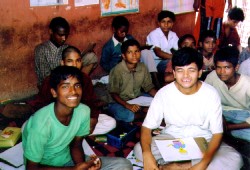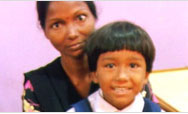You are here » Home » Telling Our Story
First Person
At-risk runaways still have an opportunity for an education
Runaways Get a Second Chance

| |
Photo: USAID/ Virginia Foley
|
|
Runaway boys attend informal classes in the police headquarters at New Delhi Railway Station.
Recent runaways are much more likely to accept placement in a shelter home than those who have learned to live on the street.
|
Close to 150,000 street children live in New Delhi, of which 7 — 10 percent are runaways.
More than 2,500 of these children live in and around the New Delhi Railway Station, where they scavenge
for food in rubbish heaps and sleep between the tracks. Runaway girls who show up at the train station
tend to be picked up by pimps within a day. All of the children are potential victims of drug peddlers,
child traffickers — and the harsh street life of New Delhi.
Salaam Baalak Trust is a USAID-supported non-profit organization established in 1988
to provide street children aged four to fifteen with food, security, medical treatment,
shelter and education. A 24-hour hotline is offered for children in distress, as well as
a comprehensive HIV/AIDS awareness program.
Social workers help children return to their homes, with supervision, whenever possible.
Four shelters house children who cannot go home, while others, who choose to remain on the street,
can receive an informal education at locations around New Delhi.
Social workers from Salaam Baalak Trust visit the station platforms daily to collect
the newly arrived runaways — about 25 girls and 80 boys each month. Recent runaways are
much more likely to accept placement in one of the shelter homes than those who have learned
to live on the street, but children who prefer the street may still attend classes and have access
to other services. The organization also provides medical checkups and treatment, health education
and referrals to government hospitals for treatment of serious illnesses or emergency intervention.
With USAID's help, Salaam Baalak Trust hopes to become a resource and partner for other organizations
involved in helping India's street children.
Print-friendly version of this page (40kb - PDF)
Click here for high-res photo
Back to Top ^ | 

